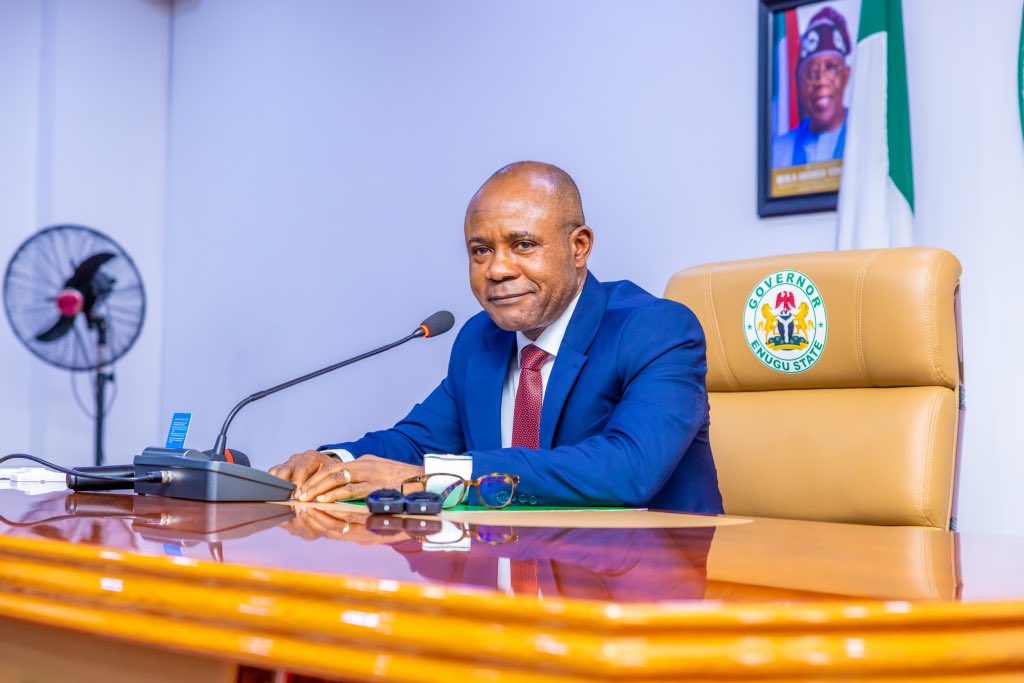While discussing the 2025 edition of BudgIT’s State of the State Report, an annual publication that evaluates long-term fiscal performance and sustainability of Nigerian states, Arise News ace presenter and social activist, Rufai Oseni, described Enugu State’s emergence as the likeliest state to survive outside of the receipts from the Federation Account Allocation Committee, FAAC, as “The Enugu Miracle.”
His words: “All of a sudden, Enugu has become a haven for raising money. The Governor Mbah some people never gave a chance is doing so well. He is putting digitisation in place. Enugu is now part of the few states in the country that are actually viable; that is, if they do not get FAAC, they should be able to run… If Enugu can do it, if Enugu can create a miracle – the Enugu Miracle – then what are others doing?”
One cannot but agree with Oseni, especially given where the state is coming from. Indeed, Enugu’s surge under Governor Peter Mbah can be likened to the miracle of five loaves and two fish as recorded in Matthew 14: 14-21. Observing that the multitude that was with him since morning was hungry, Jesus’ disciples asked him to release them to go into the villages to find something to eat. But Jesus, instead, asked them to feed the multitude – to which they exclaimed in bewilderment that they had just five loaves of bread and two fish left. But Christ took that little, blessed it, and asked his disciples to serve it. 5,000 persons were fed. Yet, in the end, 12 baskets of leftovers were gathered.
According to BudgIT’s 2025 State of the States Report, Enugu State is the most probable state to finance its operating expenses exclusively from internally generated revenue (IGR) without relying on FAAC. The findings were based on Index A, which measures states’ ability to meet recurrent expenditure obligations relying only on IGR. The research methodology for Index A was the ratio of operating expenses to the state’s IGR.
Advertisement
According to BudgIT, states that rank higher on this index exhibit greater financial autonomy and long-term viability. “States that perform strongly on Index A have comparatively limited dependence on FAAC allocations and thus possess greater viability if they were to theoretically exist as independent entities,” the Report states.
The ranking in this regard shows that Enugu State scored 0.68, implying that 68 percent of the state’s IGR would have catered to its operating expenses. Enugu is trailed in the top five states by Lagos State (0.83), Abia State (1.56), Anambra State (1.66), and Kwara State (1.73).
On Index A1, which measures IGR growth, Enugu again leads the ranking, followed by Bayelsa, Abia, Osun, and Kano. These states recorded the strongest momentum in boosting internally generated revenues during the 2024 fiscal year. According to BudgIT, “While it may be too early to celebrate, as the uptick could partly reflect increased inflows from federation transfers, it is a much better performance than the previous year.”
Advertisement
In the meantime, whereas Enugu and Lagos lead in IGR ranking, fewer states meet the 50 per cent threshold, as BudgIT’s 2025 State of the States report shows that the number of states generating enough revenue to cover their operating expenses has reduced compared to 2024. Unfortunately, according to BudgIT, 28 states still depend significantly on federal transfers and other external inflows to fund their operations.
Meanwhile, whereas those who have expressed surprise at Enugu State’s ranking are in order, especially given where the state is coming from in terms of IGR, those who have keenly followed the state’s giant strides and redirection under Governor Peter Mbah, actually saw it coming.
For instance, Mbah has drastically reversed the state’s Recurrent Expenditure-heavy budget culture – which is actually a subsisting national tradition. Before his coming, the state’s Capital Expenditure hovered around figures not exceeding N30bn, which amounted to about a Capital Expenditure to budget ratio of about 25 to 35 per cent. But in the 2024 budget, Mbah tweaked things positively for the state. That budget consisted of N107.2 billion Recurrent Expenditure or 21 per cent of the record N521.5bn budget and a Capital Expenditure of N414.3 billion, representing 79 per cent of the budget.
While Nigerians thought that they had seen it, with the new order earning the Mbah Administration reviews by public analysts and editorial comments by several national dailies, he actually took it a notch higher in 2025 budget. The budget comprises N837.9 billion Capital Expenditure, representing 86 per cent of the N971 billion budget, and N133.1 billion Recurrent Expenditure, representing only 14 per cent of the entire budget.
Advertisement
However, of great significance is the state’s quantum leap in terms of IGR profile. Although Mbah met the state’s IGR at N30bn in May 2023, he ramped it up to N37bn by the close of that year and scaled it up to N180.05bn by the end of 2024, marking a nearly 400 per cent increase in the state’s IGR profile.
Expectedly, the question on the lips of many is: how was that possible? Basically, whatever has happened in the IGR space is rooted in the principles of transparency, traceability, and accountability of the Mbah Administration. The state’s IGR drive has benefitted so much from the technology to block leakages and also from widening the tax net to bring more people into the revenue stream without increasing the tax rate.
The Secretary to the State Government, SSG, Prof. Chidiebere Onyia, provided a deeper insight into the state’s IGR revolution in his keynote address at a recent high-level strategy retreat organised by the Governor’s Revenue Assurance Team. In the keynote speech at the retreat themed “From Silos to Synergy: Achieving Unified Revenue Targets Through Coordination and Accountability,” Prof. Onyia gave a participant-witness account of Enugu’s transformative journey, which has practically redefined governance, accountability, and fiscal performance in the state.
“When Governor Peter Mbah entrusted us with the mandate to reposition Enugu as a model of efficiency and innovation, we knew that business-as-usual would no longer suffice. We needed a bold shift from fragmented silos to a unified, data-driven, and performance-oriented revenue ecosystem. One of the most decisive reforms we undertook was the complete stoppage of cash collection across all MDAs. This was not merely a procedural change; it was a philosophical shift toward transparency and traceability,” he stated.
Advertisement
The result is that in Enugu State of today, every payment is now routed through digital platforms, ensuring real-time monitoring and eliminating leakages. This bold move has radically reduced opportunities for sharp practices and also enhanced public confidence in the revenue collection system. It has equally helped the administration to build a central revenue intelligence dashboard, allowing the government to monitor every transaction across the state.
Furthermore, the administration introduced a Performance Appraisal Framework for all Ministries, Departments, and Agencies, with each MDA now assigned clear revenue targets linked to their operational mandates. But it does not end with the targets. Monthly and quarterly reviews are conducted, with performance scorecards publicly shared. This enables the government to place underperforming agencies on corrective action plans, while high performers are recognized and rewarded. Importantly, this approach has promoted a culture of healthy competition, innovation, and ownership among public servants.
Advertisement
The administration has also prioritised capacity building for revenue officers, concentrating on ethics, digital tools, and customer service, thus not just improving revenue, but equally strengthening the social contract between government and governed.
In the same vein, sharp practices in the revenue collection space are no longer overlooked. As the governor often points out, accountability is not just about systems; it is about consequences. Thus, the administration has maintained a resolute stance against corruption, investigating and prosecuting several cases of fraudulent revenue diversion. The administration further set up a Revenue Compliance and Enforcement Unit, which works very closely with law enforcement and the judiciary, while whistle-blower channels have been activated, thus enabling citizens to report malpractices incognito.
Advertisement
Importantly, the Mbah Administration has earned the faith or confidence of the people that whatever taxes and other payments they make would be used to work for them. Although there were initial hesitations primarily spurred by old experiences, the people soon realised that with Mbah, it is business unusual. With over 2,000 verifiable completed and ongoing projects spread across the 260 wards of the state, it is a case of the Igbo saying that you may preach to the blind that there is oil in the soup, but not about salt. He can tell them, using his buds.
Again, the deployment of a real-time project management dashboard has, among others, visibly strengthened the link between revenue and results, as the citizens can now see how their taxes are transforming roads, schools, hospitals and water systems in real time.
Advertisement
Yet, Governor Mbah will always be credited with giving governance a human face, ensuring that revenue drive is not without an ample touch of humanity. For instance, in response to complaints received about taxes and the like, he recently inaugurated a committee to carry out a comprehensive review of tax policies, rates, levies, and fees under the control of the state. The committee, which draws its membership from interest groups, market associations, government, organised labour, and the civil society, among others, is to benchmark Enugu State’s revenue practices against Lagos, Abuja, and other South East states as they relate to Land Use Charge, Certificate of Occupancy (C-of-O) fees, market levies, and stall rents, business premises registration, signage and advertisement fees, among others, and recommend reforms.
Although there is still a long way to go, if Governor Mbah continues on this trajectory, then he is on his way to actualising his campaign promise to wean Enugu State off FAAC allocations and ensure they are saved for future generations, he will also be on the path to actualising his overarching vision to grow the state’s economy sevenfold from $4.4bn to $30bn, eradicate poverty and position it as the premier destination for investment, business, tourism, and for living may well become a fait accompli. It is only a matter of time.
Anichukwu writes from Enugu
Views expressed by contributors are strictly personal and not of TheCable.


